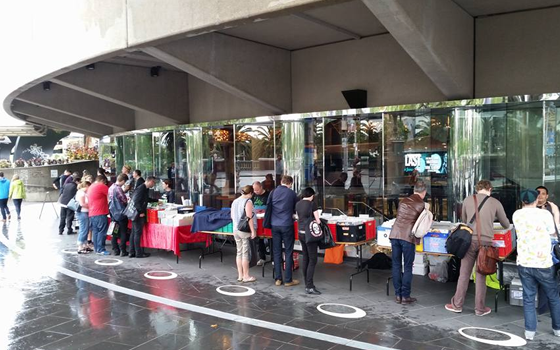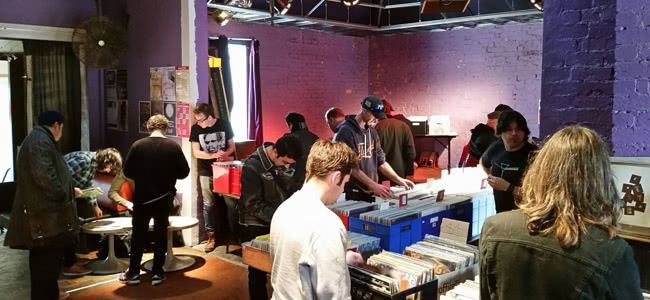Record fairs are becoming more and more popular in recent times as vinyl itself has also made a comeback, with music fans always looking to buy, sell, or just plain peruse music they could use to fatten up their record collections.
The Crate Digger Record Fair has been going on for a while now, with numerous events being held each year, and on November 5th they’ll be holding another edition at The Hood at the Preston Markets, as part of the Darebin Music Feast.
Looking forward to skimming some vinyl, we chatted with Andy Moore, the organiser of Crate Digger’s record fair to get his thoughts and advice on the joys of collecting vinyl, his best record bin finds, and the importance of vinyl in today’s increasingly digital age.
Talking Vinyl With Andy Moore
The Crate Digger Record Fair has been running for a long time now – how has the interest grown over the years?
The fairs have been running since 2010, with the first one going completely bonkers as Bruce Milne, former owner of the Tote, called me up a week beforehand asking if he could sell his collection at it. We had a queue out the door just to get in, and then another queue to get into the room with all of his stock.
We’ve never returned to that level, but it’s fair to say that interest has grown considerably since the fairs that immediately followed that first one. The resurgence of records as a format in recent years has also helped.
Apparently some people head to the fair to sell their collections in bulk. How often do you see this, and what are the reasons people give?
Love The Beatles?
Get the latest The Beatles news, features, updates and giveaways straight to your inbox Learn more
A few times each year people will book a stall to sell an entire collection, which I always find particularly interesting as you get to see exactly what they have bought over the years, rather than the crap that they no longer want. Sometimes it is the result of a sad event such as a death of a family member or friend, whereas other times it is a fire sale before relocating interstate or overseas, a distribution or shop that has gone bust, those sort of situations.
There have been a few sellers over the years who have decided to convert their collection to a digital format using a USB turntable and then sell everything they have. The reasons are generally pretty varied.

The Recording Industry Association of America reports that sales of vinyl in the US have seen a decline for the first time in the decade, having just hit their highest peak since 1988. Do you see the vinyl resurgence slowing down?
That’s an interesting statistic. I haven’t seen any evidence of vinyl sales slowing especially given that Melbourne has seen the number of vinyl retailers rapidly increase over the past two years, not to mention the number of fairs and pop-ups that happen around town. When we began it was pretty much just the big ones at Essendon and Box Hill (formerly Camberwell), and with all of these extra opportunities to buy records, people still seem to lap it up.
Maybe it has reached its ceiling, but I am guessing it will remain strong for years to come. You can argue that it is the most relevant physical format these days, it has beaten down all technological advances that threatened its existence and is still standing.
A lot of companies have begun repressing old records to capitalise on the boom. What sort of impact have they had on the industry, vinyl collectors, or those who enjoy ‘crate digging’?
As a collector myself, I prefer to buy older pressings of records rather than reissues, but the bottom line is that a lot of stuff is really difficult to find – and expensive – in its original form, so a repressing makes it easier to have the records you want on the vinyl format. Then there is that period through the 1990s and early this decade where a lot of releases were only issued on CD, so the recent vinyl pressings of these releases is the first time they have been available on wax.
Repressings have also impacted on the value of records, although it seems that the laws of economics seem to not always apply. You’d expect reissuing a record would increase the supply of a title and thus forcing the price of the original pressings down as potential customers buy the reissues at a more affordable price, but in some instances, it actually causes a price jump in the old versions.
I guess that this is from the added publicity a release gets when it is reissued, generating more demand, but it is hard to tell. All of that aside, it really comes down to the individual.
Is ordering a new pressing of an old album somewhat defeating the purpose of enjoying vinyl?
To me, not necessarily, but to many, yes it would be. It goes back to the individual. Many repressings of old records come with bonus tracks and extended liner notes, gatefold pressings, a whole host of things that set it apart from the original. That said, there are certain types of records that I like to hear a bit of noise on, which is something that you can’t get with a new record.
I bought an original UK pressing of the first Rolling Stones record in Glasgow for £1 and boy is it a beaten up record. There’s a lot of crackle going on when I play it, but it doesn’t skip once. The cover is water damaged and tattered at the edges, yet I wouldn’t have it any other way. That record is more than 50 years old and has been flogged at parties for 50 years. It’s just a cracking record and I often wonder how many owners there have been and where it has travelled over the years. Oh well, it lives in Melbourne now, and it’s a record that, in my opinion, deserves to be owned in such condition.
Ringo Starr’s mint condition copy of The Beatles (number 0000001) went for $920,000 at auction recently. A fair price? How much is too much for a record?
Wow, I hadn’t heard that. It’s a lot of money but that record is a piece of history and you could even argue it’s worth more than that. I wonder if it has ever been played or has always lived in its sleeve? A fair price is whatever someone is willing to pay for a record, but so many records have far more significant meaning and value than the music that they contain.
What’s the most expensive record you’ve bought? And your most prized?
Oooooh, tough question. I couldn’t say the most I’ve paid for a record, but it’d be somewhere around about $100 or so – I’m a bit of a tight arse. One of the most expensive records that I own would be an original pressing of The Clean’s first single, Tally Ho/Platypus. There’s 300 copies of it and I found it for $1 in a café in New York years ago. There’s currently a copy of it listed on Discogs for€1,000, so I think that was my best score ever. I’d never sell that record, I just love it too much. It’s one that I certainly play, I even used to take it out DJing with me. I
have some really prized records that mean a lot to me, but may not have much value to others. Things like signed records by Mudhoney, Reigning Sound, Jay Reatard and other acts that I love.
Does your own collection have some sort of theme tying it together?
Not especially but there are certain record labels and bands that I have collected as much as I can from. That is when the real addiction kicks in, when you are buying records of bands that you don’t really like, just because you want to collect the whole set. I don’t do that as much these days, but I must say that I am still a sucker for anything with that Flying Nun label, even though I’ve sold a lot of my Kiwi records.
I have some friends in Europe with pretty crazy collections, where they only collect rockabilly records and nothing but. Or a friend who has his collection in drawers labelled by record label, and you pull them out and he has every original release on that label in order – Sub Pop, Amphetamine Reptile, SST, Sympathy For The Record Industry, Crypt, etc. His collection would be worth more than his house.

What are some tips you’d give to people looking to get into record collecting?
My main tip is if you find a record that you really want, buy it, even if it is a little too expensive. It pains me to think about the number of times that I found a record I was chasing, held it in my hands as I kept looking through a shop or a stall, then decided against buying it and have never seen it since or only found it for twice that price. You’re best to buy it when you see it, and if you find a better copy that is cheaper at a later stage, you can always buy that and sell your other copy.
I think record fairs are the best place to start buying for a collection as you have everything you need in the one spot – records of all genres and price points. Write lists for yourself, talk to stallholders and ask after specific records.
Any suggestions for a starter turntable?
Turntables, my other growing collection. It is harder to find cheap used turntables these days but if you are gunning for one, I recommend garage sales, Gumtree and eBay, or the Mill Markets and other antique and collectable stores generally have a good range of great looking, older style stock. Some of the record stores in the inner north like Goldmine Records and Thornbury Records have good stuff too.
If you’re after something new in the budget range, there are brands like Crosley that take a vintage look and have a variety of options with built in speakers or as a stereo component.
What are your views on the cassette craze that’s threatening to kick off – which format reigns supreme?
Personally, I’m not into cassettes but I do love the DIY aesthetic of bands dubbing their own copies and making up their own covers for a limited run. I love the fact that people obsess over what is largely considered an obsolete format, but for me, I’ll always be a lover of records, although I do love my copy of Joy Division’s Closer cassette in a box. It’s a beautiful piece of packaging. Vive la vinyl!
The Crate Digger Record Fair will be held at The Hood at the Preston Market on November 5th, check out the Facebook event page for more info.




































